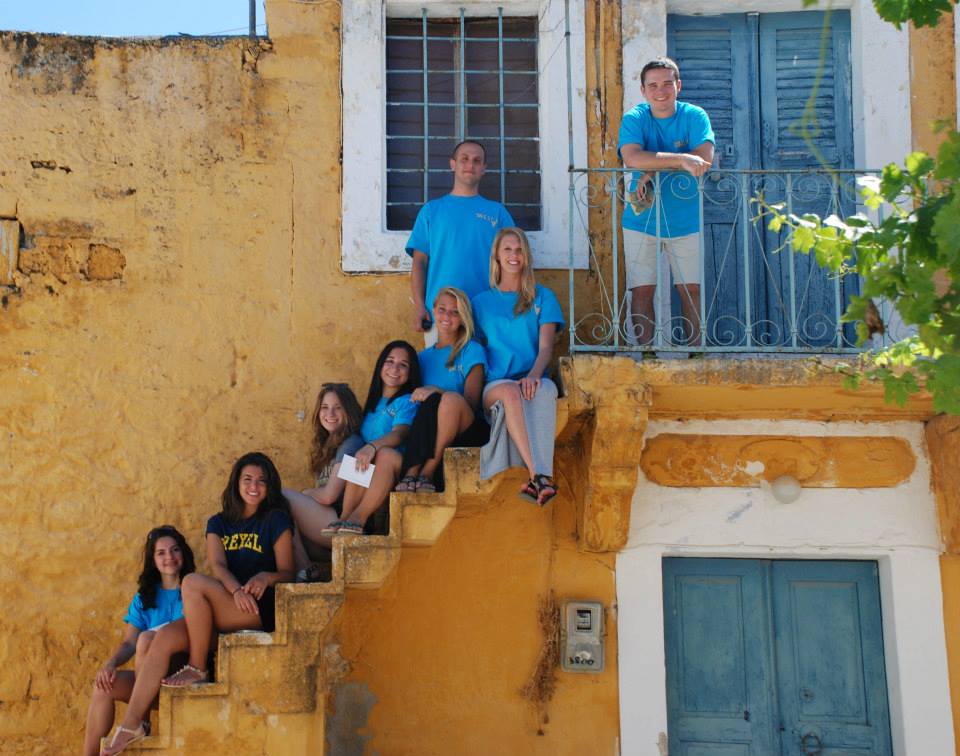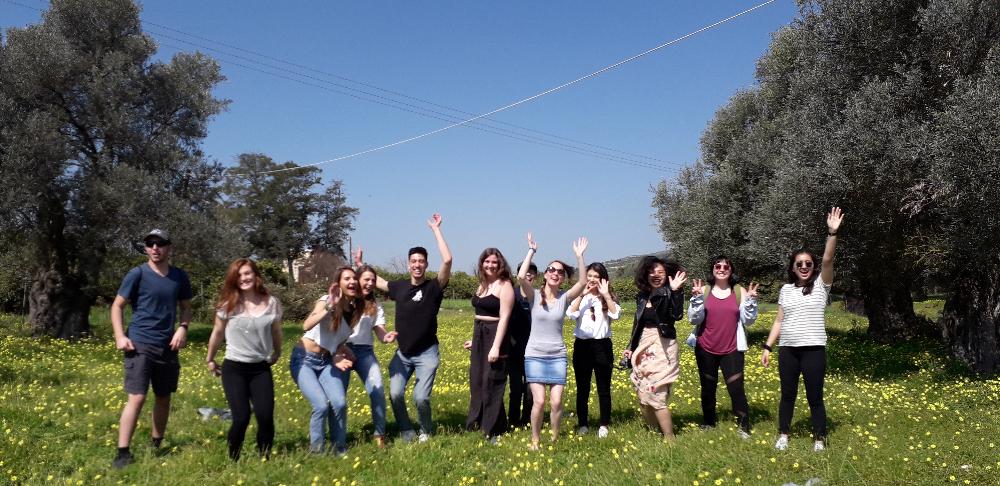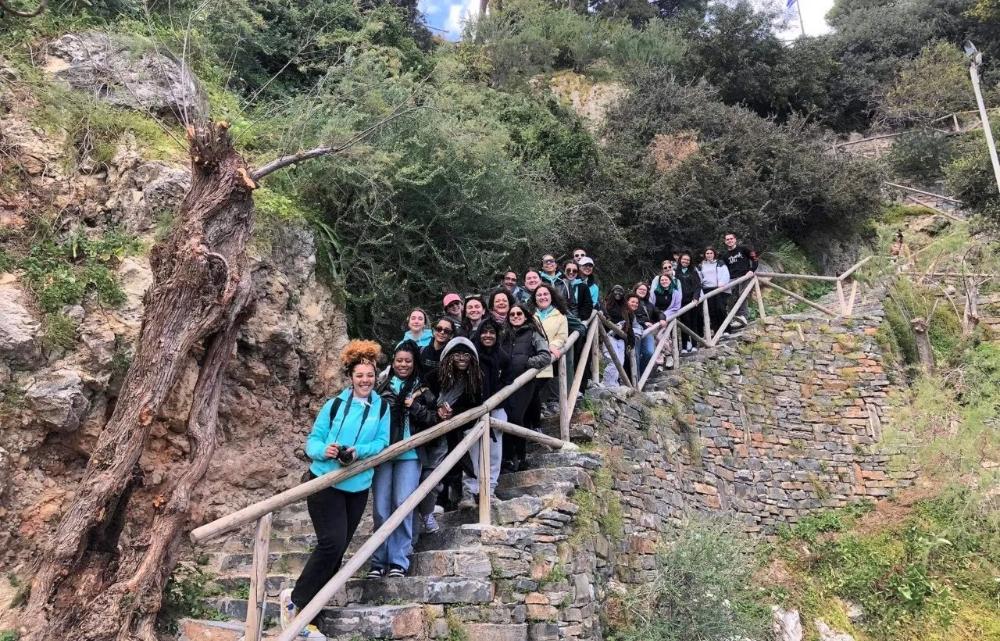Spring Break in Greece:
Mediterranean Crossroads

Greece is awash by the Mediterranean and serves as a crossroad among three continents. Crete is an island which lies between the so-called East and West. As one of the largest island societies in the Mediterranean, Crete has served exceptionally in that networking area while it also holds a significant tourist, economic and social role for its surrounding countries. This course offers students the opportunity to literally dive into the Greek experience through an empirical study of its rich multifaceted culture as it is expressed today on the island of Crete. Field trips have been incorporated into the course requirements, exposing students to interdisciplinary ways of Eastern Mediterranean history, culture, traditions and society. Students are guided through the techniques of fieldwork and participant observation to attend family, household, village and city customs and practices as these all are valuable mechanisms for learning the social, economic, cultural, political and religious ways that underlie and make Greek culture distinctive and important at a Mediterranean level. Selected locations, such as archaeological, historic and cultural sites, farms, markets, local businesses, social networks and households, are part of those field trips. Traveling functions as a course requirement while students reflect on their Greek experiences through a looking-glass process.
Why Crete?
• The birthplace of the Minoan civilization and the Mediterranean Diet
• An eco-friendly, sustainable lifescape with UNESCO-NATURA sights
• One of the 21 World Smart Communities with ICT infrastructure
• The only EU location with locally-grown bananas and the top quality EVOO
• A region of 3 high ranking Universities, 4 Airports, 6 military bases and a USN base
• One of the most popular European destinations for ERASMUS students
• An economic region with the highest density of cooperatives per capita
• A hub of the oil and gas reserves in Greek EEZ, as well as a station of the EuroAsia interconnector cable connecting Israel with Cyprus
• A focal point of the Blue growth EU policy Constitution of Sea as well as of energy challenges and security
• A subtropical area in EU, a… paradise with more than 300 dpy of sunlight
• The home of “Thalassokosmos”, the only research aquarium in the Mediterranean
• A popular international coop destination for Drexel; more than 40 placements in 4 years
Underlying Research Themes: Archaeology & Mythology, History & Folklore, Literature & Performance, Arts & Crafts, Local Economy, Politics & Governance, Rural & Urban Living, Fauna & Flora, Natural Environment & Climate, Organic Farming & Produce, Education & Research, Architecture, Mediterranean Diet, Tourism, Innovation, Identity & Culture Islandness, Syncretism.
By participating in this program, students will:
- Integrate other courses with association and consolidation to/with the learning experience abroad
- Connect with local business and social environment
- Understanding Islandness and Nissology
- Cultivating a community of co-op employers in Crete
- Explaining University Research in Crete (--as part of the EU reality)
- Elaborating how sustainability meets integrated cultural heritage in a hybrid learning Minoan crossroads
- Taking the… virus “by the horns”: Manifesting Cretan vitality, creativity and resilience in times of adversity
Watch Drexel 2023 students on
local news channel in Crete.
Credit/Registration
Students will be registered for GST T280: Mediterranean Crossroads for 3 credits as a part of their spring term course load. Students must leave space for these 3 credits in their credit load, or will otherwise be billed for exceeding the 20 credit term maximum.
Pre-requisite: None. All undergraduate majors are welcome to apply for this program, including First Year students.
Requirements: Pre and post academic requirements. For details review the Syllabus_2025. The final grade will be based on a combination of assignments and class preparation and participation.
Instructor: Dr. Maria Hnaraki (also spelled “Chnaraki”), a professor of anthropology, folklore and ethnomusicology, a writer and an accomplished scholar in the field, has extensively researched cultural identity expressions, traditions and customs, such as music and dance events in the Mediterranean, as well as investigated topics in nissology, experiential learning and hybrid educational environments. While the founding Director of Greek Studies at Drexel, Dr. Hnaraki created more than 30 university courses, several of which are unique in the USA, with the educational purpose of implementing an integral, holistic, interdisciplinary, academic approach to the Greek and Mediterranean reality.
Arrival Date: March 20, 2026
Return Date: March 29, 2026
Prior to departure, students are required to attend an introduction/preparatory session. Details TBD.
Program Activities and Visits
Throughout this program, students will meet several resident specialists on-site for presentations and tours. For a detailed list of activities and visits, review the syllabus:
- Archaeological, mythological, historic, literary, artistic and cultural sites
- Co-operatives and research centers
- Nature reserves, organic farms and vineyards
- Organic farmers’ markets and open-air markets
- Traditional settlements
- Food production facilities
- Cooking workshop
- Cretan music and dancing class
- Pottery workshop
D A T E S |
ITINERARY (CRETE-GREECE) |
March 20 2026
FRIDAY
March 21 2026
SATURDAY
March 22 2026
SUNDAY
March 23 2026
MONDAY
March 24 2026 TUESDAY
March 25 2026
WEDNESDAY
March 26 2026
THURSDAY
March 27 2026
FRIDAY
March 28 2026 SATURDAY
March 29 2026
SUNDAY
|
Arrival/Start Date
Ideal Hotel: Welcome Dinner at 7pm
Ideal Hotel: Breakfast at 9am; Orientation at 10am
Cooking Workshop at 5pm; Dinner at 7pm
Bus Departure: 8.30am / Bus Return: 5pm
Archaeology & Literature
Focus on the Bronze Age civilization that flourished on the island of Crete, known for its advanced technology, culture and art. Explore local literature themes of spirituality, existentialism, and the human condition.
Minoan Palace of Knossos, Archaeological Museum,
Nikos Kazantzakis Tomb, Anopolis (Pottery Workshop)
Ideal Hotel: Breakfast at 8am & Dinner at 7pm
Bus Departure: 8am / Bus Return: 8pm
Local Economy & Society
“Olive and Bread”: What are the main economic activities that power livelihoods and shape the Cretan community character by providing jobs, essential goods, and a sense of place?
Terra Creta Olive Oil Company (Kolymbari), «Manna» Cretan Rusks Bakery (Platanos), Chania Old Port
Breakfast “to go” / Dinner at 8pm
Bus Departure: 8.30am / Bus Return: 5pm
Mythology & Language
Crete: Land of the Labyrinth; Birthplace of the European Civilization. Hieroglyphics, linear and other forms of writing attested and examined.
Traditional Village of 10 saints, Gortyna Archaeological Site, Matala Bay Neolithic Caves
Ideal Hotel: Breakfast at 8am & Dinner at 7pm
Bus Departure: 8.30am / Bus Return: 5pm
History & Culture
How have the periods under Greek, Roman, Byzantine, Venetian, and Ottoman rule shaped Cretan contemporary identity?
Arkadi Holocaust Monastery, Rethymno Old Town
Ideal Hotel: Breakfast at 8am & Dinner at 7pm
Bus Departure: 9am / Bus Return: 6pm
Greece in the EU and the World
The benefits and the challenges of an EU country at the crossroads of 3 continents. Technology, politics, and energy “hot” topics at the international and local media.
Region of Crete, Kotsanas Museum Crete, Kazantzakis Museum, Episkopi Ostrich Farm, Creta Channel
Ideal Hotel: Breakfast at 8am & Dinner at 7pm
Bus Departure: 8.30am / Bus Return: 6pm
Crete as a Mediterranean Island
The Mediterranean Lifestyle: Diet, Flora and Fauna.
Cave of Zeus, Lasithi Plateau, Mediterranean Aquarium
Ideal Hotel: Breakfast at 8am & Dinner at 7pm
Bus Departure: 8.30am / Bus Return: 4pm
Ecology, Environment & Sustainability
Crete’s biodiverse ecosystem and strong focus on sustainability initiatives, renewable energy and ecotourism.
Heraklion Farmers’ Market, Bioaroma, Agios Nikolaos Town
Ideal Hotel: Breakfast at 8am & Farewell Dinner at 8pm
Departure/End Date
Notes:
- “Bus Return” times may deviate pending on unexpected delays
- Lunch breaks provided; “out of budget” lunch places will be suggested
- Daily routes & itineraries subject to change based on weather, road & other sort of emergencies
|
Due November 15th: $500 Advance Payment + $25 application fee
Due January 15th: $2,050 Final Payment
All payments are non-refundable unless declined admission or program cancels for unforeseen reasons.
Included in Program Fee:
- In-country transportation by private van and driver
- Guides for all scheduled excursions
- Expert guide/resident specialist fees and entrance fees to historic sites
- Private tours and tastings with the owners-operators of an organic winery, olive oil producers
- Scheduled music, dance, pottery and cooking classes, demonstrations and meals
- Accommodation in double to quadruple occupancy in private apartments with private bathrooms
- All continental breakfasts and dinners as well as several incidental group meals
- On Call Emergency Assistance, health insurance & quarantine coverage
Not Included in Program Fee (Approximate):
- Round-trip airfare: $1500
- Airport transfer: $45
- Spending money: $250
- Meals: $80
- Passport: $160
- Course materials $150
Greece ICA Grants & Scholarships
Grants generously supported by the Vidalakis Scholars Fund ranging from $750 - $1,000 will be awarded to accepted students with demonstrated merit (as reflected through their ICA application) and financial need. Award determinations will be made after the ICA application deadline. Awards can be used toward out of pocket expenses such as flight and course materials. All recipients are required to complete a post travel survey and testimonial.
Limited scholarships are also available through the
George and Vasiliki Harris Endowed Scholarship Fund in Greek Studies.
Global Studies majors may be eligible for an
Excellence in Greek Studies grant.
Students may also request an Adjusted Cost of Attendance by submitting the ICA program fee and estimated out of pocket expenses listed above to Drexel Central (via askdrexel). Doing so could make students eligible for additional financial aid.
- Housing and Meals: Students will be provided rooms at https://www.idealapts.com/, a family, friendly run establishment. That informal, cozy atmosphere makes them feel relaxed and at home. The location of the apartments at Kokkini Hani is geographically ideal as housing is located only 15 minutes away from the cosmopolitan capital city of Heraklion. All apartments have two bedrooms, kitchen, lounge, bathroom, wc, air conditioning and balcony overlooking the pool or gardens and are equipped to a high standard with all necessary appliances. Cleaned daily and fresh bedding and towels provided. Pharmacy and supermarket a few meters away. The “Ideal”, on-site taverna will be serving breakfast and dinner. The variety of dishes served represent the famous Mediterranean-Cretan Diet, prepared daily with fresh produce picked from the apartments’ garden by “Mrs. Maria”.
- Is a visa required for US citizens? American citizens are not required to have a visa for this program. Students of other nationalities should confirm visa requirements on the Greek Embassy website.
Grading Scale
| A+ |
A |
A- |
B+ |
B |
B- |
C+ |
C |
C- |
D+ |
D |
F |
| 97-100 |
93-96 |
90-92 |
87-89 |
83-86 |
80-82 |
77-79 |
73-76 |
70-72 |
67-69 |
60-66 |
59 and below |
